
10 minute read
It’s Technical


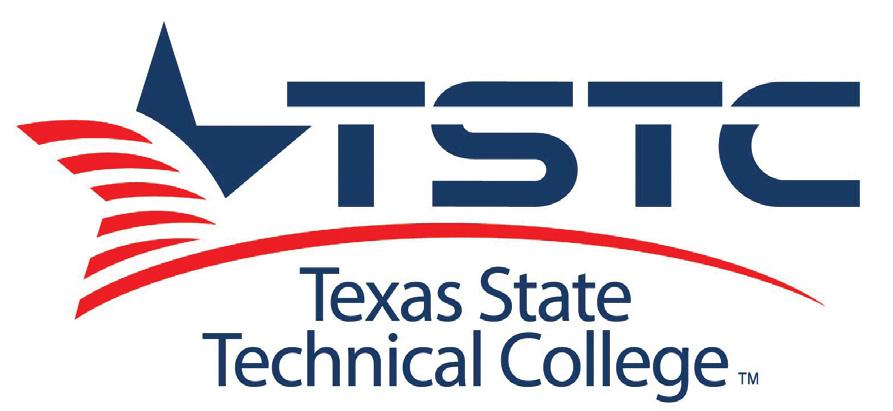


TSTC’s Approach to Matching Training with Jobs
WRITTEN BY JEREMY HEATH, Assistant Director of Economic Development, Rosenberg PHOTGRAPHY BY BAC PHOTOGRAPHY AND DESIGN
Since January of 2015, Randy Wooten and John Kennedy have collectively been the faces of Texas State Technical College (TSTC) in Fort Bend County. From earning the political capital necessary to secure the public and private sector funding that moved the project forward, to participating in the site selection process, to educating the public and marketing the Wooten, a 29-year US Air Force Veteran who now serves as Vice Chancellor, said it helped that TSTC already had established regional brand equity through the extension campus it formerly shared with Wharton County Junior College in Richmond, but that the biggest key was support. Not only did community leaders throughout Fort Bend County invite Wooten and Kennedy to spread the message at various meetings and events, but many who received the message were quick to share it themselves. “In the two years or so since I’ve been in Fort Bend County, I’ve probably given about 50 different presentations – sometimes more than one a day, sometimes one or two a week,” Wooten said. “It just kind of depends on what’s we’ve never said, ‘No,’ to someone who wanted to
brand, to overseeing construction, to managing the campus, Wooten and Kennedy have remained the rocksolid, go-to guys for everything at the new Texas State Technical College Fort Bend Campus.
Randy Wooten
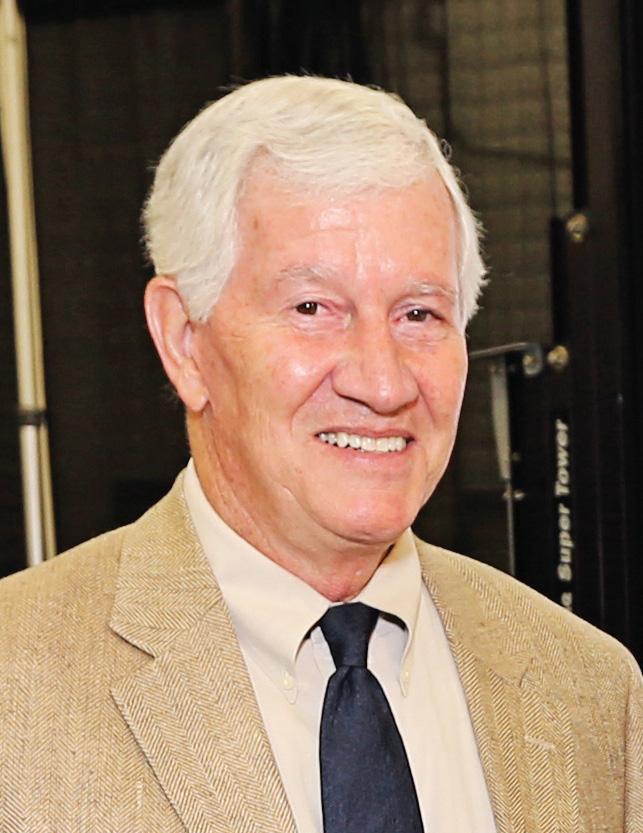
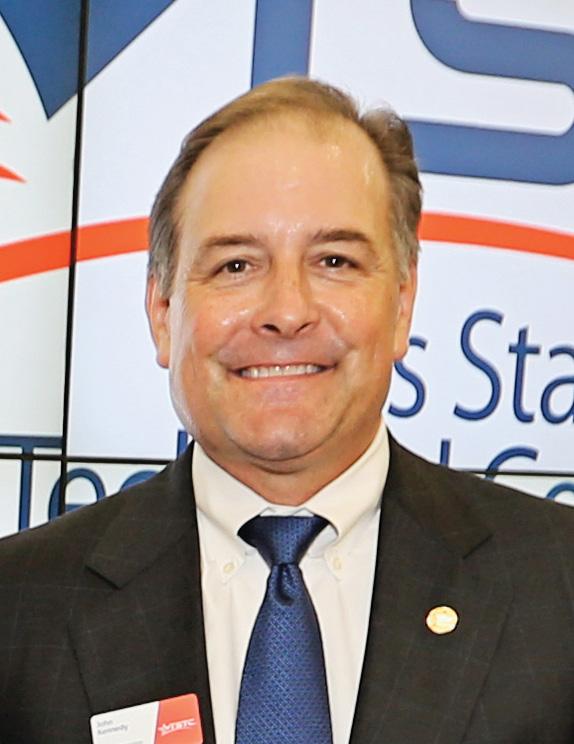
John Kennedy
The duo’s short-term goals and primary objectives have shifted constantly to match up with where they are in the development of the campus. But now that they have had a full semester of overseeing the education of students on campus under their belts, they’ve been able to direct more of their focus to the TSTC System’s primary goal of preparing students for and placing them within impressed with the scope of the project and the projected to secure jobs for graduates and certificate holders.
the workforce.
Building on Success - One Phase at a Time -
As of February of 2017, the phase one building has been operational since the fall of 2016 and boasts about 300 students for the spring semester. The phase two building’s in the fall of this year. When fully built out, the 80-acre campus on I-69 between FM 2218 and State Highway 36 in Rosenberg will feature at least five buildings and could accommodate more than 5,000 students, making it comparable to TSTC’s flagship campus in Waco. The TSTC System celebrated its 50th anniversary in 2015. In those 50 years, the system has grown from and extension campus of Texas A&M to an independent, statewide, multi-campus operation with its own board of regents. The Fort Bend Campus is the ninth permanent campus in the system, and the 260 students that registered for the fall semester exceeded even the highest of expectations system-wide, Wooten said.
Community Support
going on and who the audiences were, but in that time, hear about TSTC.”
Performance Based Funding
Wooten said those who heard the message were regional financial impact that results from an increase in local workforce education. However, the real eyebrowraiser was a key aspect of TSTC’s funding formula, known as the Return Value Funding Formula. In a nutshell, TSTC campuses earn their state funding based on their ability construction is well underway and should be operational
Each campus has a direct value-added score based on the incremental state tax revenue attributable to former TSTC students’ jobs.
“When that topic (the funding formula) comes up, and we give a brief explanation of it, that’s when I get the most non-verbal reactions from the audience,” Wooten said. “You can see the eyebrows go up, watch them nod, watch their mouths open. You can see the literal surprise on their faces and watch the wheels turn. And when I get my message back to the folks at the home
base in Waco, it’s that the funding formula that seems to be the biggest most interesting thing about TSTC – across the board. It resonates with every single person in the audience.”
The funding formula not only ensures a strong return on investment for students by increasing the chance of them gaining employment upon graduation, it also ensures taxpayers a similar return.
“One of the things we’ve always said, is that if you’re a taxpayer – and in one way or another we’re all taxpayers – you’ve got to love this. Tell me any other education institution, governmental institution, state, county, federal that looks at you and says, ‘You’re going to end up giving me some money, but I don’t want your money unless I deliver what I say I’m going to deliver to you. If I’m not 100 percent accountable and deliver what I’m supposed to deliver, you don’t owe me anything.’ It’s 100 percent funded by performance, accountability or results. Nobody else is telling people that, but people are hungry for that. I don’t care what your political persuasion, this formula is based on I-earn-my-keep, and I think people want more of that out of the institutions whose job is to serve them.”
New Guaranteed Programs Planned
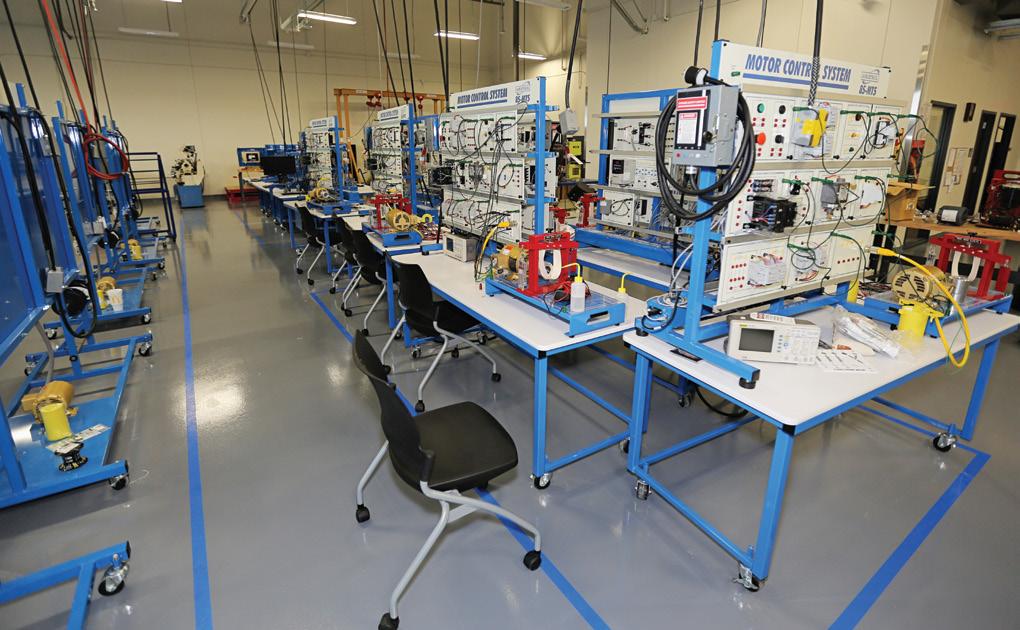
- TSTC’s Industrial Maintenance Classroom -
In the fall of 2016, TSTC started another system-wide program to ensure its focus remains on putting its graduates into the workforce, a program affectionately known as MBG – Money Back Guarantee. The MBG applies to programs such as Diesel Equipment (Heavy Truck, John Deere Construction & Forestry and OffHighway), Electrical Lineworker, Electrical Power & Controls, Instrumentation and Welding, all programs that are either currently offered or might be offered at the Fort Bend Campus in the future.
Since the crux of TSTC’s mission is to prepare and place highly skilled students in the workforce, students in MBG approved programs are also eligible for the ‘Get-aJob Program’, which teaches students how to find and secure high-paying jobs within their areas of training. If a student who earns an associate’s degree in an MBG program and participates in the Get-a-Job Program doesn’t have a job in six months, his or her tuition is reimbursed.
- Students in TSTC’s Industrial Maintenance Program -
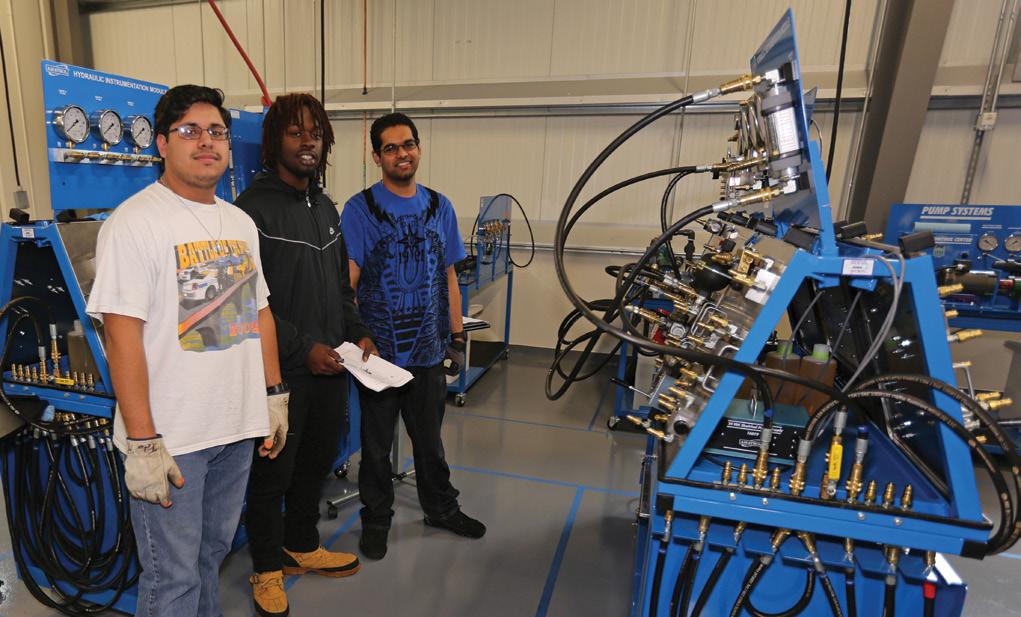
“From a recruiting standpoint it’s a little different because if I have someone who asks about the funding formula, I reach out and I say, give me your hand. And I grab their hand, and I say, ‘I am a partner with you. I have as much invested in your success as you do. If you’re not successful, I don’t get paid.’” Wooten Said. “So from a recruiting standpoint, I let them know my mission is to get good paying jobs for my students.”
Better Training for a Better Life
The Fort Bend campus currently offers degrees or certificates in HVAC Technology, Diesel Equipment Technology, Industrial Maintenance Technology, Precision Machining Technology, Cyber Security, Telecommunications Convergence Technology and Welding Technology. When the second building opens in the fall, added courses will include Electrical Lineworker Technology, Robotics/Industrial Automation Technology, Electrical Power & Controls Technology and Environmental Technology - Compliance Specialization.
“If someone asks me why we’ve chosen these specific programs, the seven current and about to be eleven programs,” Wooten said, “They’ll ask what makes us come up with that determination, and I tell them it’s demand and earning ability. For example, and this is a far-reaching example, but I’m not going to put snowremoval equipment repair in Fort Bend County, on the Gulf Coast of Texas. We want our graduates to get great-paying jobs near where they live, so we do a lot of investigation, a lot of research up front before we make those determinations.”
It’s that research that establishes the foundation for TSTC’s entire educational model. It goes beyond
preparing students for jobs. It’s about preparing them for the types of in-demand jobs that will afford them opportunities to get ahead in life.
of support Fort Bend County has given us.” “I’ve heard Randy say this a thousand times: we provide the pathway to the American Dream.” said Kennedy, TSTC’s Field Development Officer.
“As I listen to John’s answer, and everything he said is correct, I’m thinking, ‘What more could we have asked for from a community that this community has not given us,” Wooten said. “And there’s nothing.” Satisfaction in a Job Well Done Ultimately the impact of the TSTC Fort Bend Campus - and the journey taken to make it a reality - goes well beyond and we want them to be goodafford to get married, to buy a big truck, buy a house or
- TSTC’s Precision Machining Laboratory -

Local and State Support
Kennedy, like Wooten, has maintained a high level of visibility in Fort Bend County for the past 24 months, building support for the brand and establishing partnerships to help the long-term viability of the Fort Bend Campus. Financial incentives from groups such as the Rosenberg Development Corporation, the Development Corporation of Richmond, Fort Bend County, the George Foundation and the Henderson-Wessendorff Foundation helped launch the project. Overwhelming support from local elected officials and state representatives helped push House Bill 658 through the state legislature in 2015. The bill allowed for the expansion of the then extension
“The community has been extremely supportive,” Kennedy said. “There has not been one obstacle that has not been overcome. Now, we very much look forward to continue to prove that we can do what we’ve said we can do. And that is to provide a very well-trained workforce that can contribute to Fort Bend County. It’s been incredible to say the least, the amount
Wooten agrees.
funding formulas, public-private partnerships, political capital and marketing. The impact is immeasurable, because there are not units of measurement capable of gauging the improvements education can make in people’s lives, and Wooten never loses sight of that.
“We want to get the students jobs, paying jobs,” Wooten said.
“We want them to have the kinds of jobs where they can program to a full campus.
raise their kids – to realize their dreams. The reason they work is to earn a living wage, and we allow people who never could have had the dream of earning a living wage to do just that.”
In helping people find more satisfaction in their lives, Wooten finds more satisfaction in his own.
“I believe the vast majority of people want to do something that gives them self-satisfaction. And my self-satisfaction derives from being a part of something bigger than me. Something, that makes a difference.” v
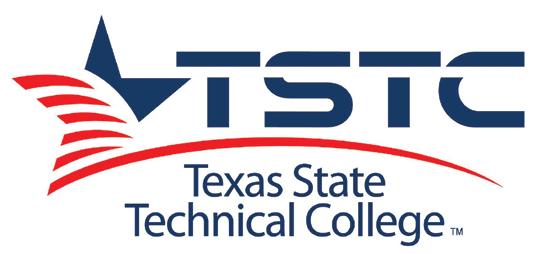
26706 Southwest Fwy Rosenberg, TX 77471 832-595-8734 www.tstc.edu
TSTC Through the Years
1965
FOUNDED
James Connally Technical Institute in Waco - as an extension of Texas A&M 1967
EXPANDED
JCTI South Texas Campus built in Harlingen 1969
SEPARATED
JCTI left the TAMU System, renamed Texas State Technical Institute 1991
RENAMED
The System took on its current name of Texas State Technical College TODAY
STILL GROWING
The Fort Bend Campus is the ninth permanent campus in the system












